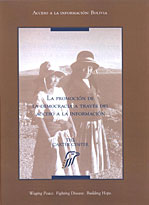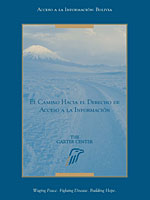As one of the poorest countries in the Western Hemisphere and with a majority indigenous population, Bolivia's attempt to transform its democracy represents one of the most important experiments in Latin America. A free flow of information supports democratic transformation and help advance citizen participation, development, and socio-economic rights.
 President Evo Morales has demonstrated a strong commitment to the right to public information. Since assuming office in January 2006, he has worked with the Ministry of Justice and Vice Minister of Transparency and Anti-Corruption Nardi Suxo to address the short-term goal of disseminating information and long-term goal of establishing a comprehensive access to information (ATI) culture. The Carter Center has supported government efforts to be capable suppliers of information by providing expertise on archiving and records management best practices and by training of civil servants on the issue of access to information.
President Evo Morales has demonstrated a strong commitment to the right to public information. Since assuming office in January 2006, he has worked with the Ministry of Justice and Vice Minister of Transparency and Anti-Corruption Nardi Suxo to address the short-term goal of disseminating information and long-term goal of establishing a comprehensive access to information (ATI) culture. The Carter Center has supported government efforts to be capable suppliers of information by providing expertise on archiving and records management best practices and by training of civil servants on the issue of access to information.
Previously, The Carter Center supported the establishment and implementation of a voluntary openness strategy to allow the government to demonstrate its commitment to transparency. The Center has provided technical assistance and convened meetings with select pilot ministries that voluntarily began to open their doors to citizens interested in government-held information. By publishing information and responding to information requests in a voluntary manner, these ministries started the process of transforming from a culture of secrecy to one of greater openness.
 The Carter Center worked with Bolivia's government, Congress, and civil society to support the drafting of an access-to-information law that met emerging international standards. The project manager and consultants traveled to Bolivia to share international experiences and to exchange ideas with local actors, while recognizing that an access-to-information law must be formulated and disseminated in a manner appropriate to local circumstances. Upon request of the Bolivian government, The Carter Center provided observations of the draft law.
The Carter Center worked with Bolivia's government, Congress, and civil society to support the drafting of an access-to-information law that met emerging international standards. The project manager and consultants traveled to Bolivia to share international experiences and to exchange ideas with local actors, while recognizing that an access-to-information law must be formulated and disseminated in a manner appropriate to local circumstances. Upon request of the Bolivian government, The Carter Center provided observations of the draft law.
To strengthen the involvement of civil society in the drafting process, The Carter Center helped create a forum for dialogue among key stakeholders. Numerous meetings with representatives from civil society, the church, media, and the private sector helped ensure greater legitimacy in the lawmaking process and yielded greater awareness and interest in access to information. To inform the debate, the Center commissioned papers that were widely distributed in guidebooks related to the law's passage and a second guidebook that focused on implementation challenges and solutions, as well as the transformative nature of the right to information. Finally, the Center facilitated the creation of local and national civil society consortia to promote the passage of the law.
In May 2004, The Carter Center opened a field office to provide programmatic continuity during the passage, implementation, and enforcement phases. This office served as an in-country resource to government and civil society partners. Although the field office closed in June 2006, the Center reestablished a field presence in September 2007 in response to a request from President Morales.
For more information regarding the Bolivia Access to Information Program or any of the Carter Center's work on the right to information, please contact program director Laura Neuman at Laura.Neuman@CarterCenter.org.
Please sign up below for important news about the work of The Carter Center and special event invitations.